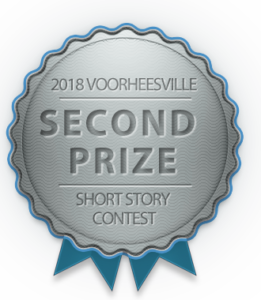
 This week week we are highlighting the five stories that won prizes in this year’s short story contest. Today, we spotlight, “An Afternoon Adventure,” by Lindsey Odorizzi, our second prize winner. This story follows Penny, a child, on her “ill-fated and short-lived adventure” in the city. At times sweet, at times scary, the story makes “the panic and confusion feel real” for us as readers, and we root at the end of the piece for this brave, resourceful youngster who wants to see the world.
This week week we are highlighting the five stories that won prizes in this year’s short story contest. Today, we spotlight, “An Afternoon Adventure,” by Lindsey Odorizzi, our second prize winner. This story follows Penny, a child, on her “ill-fated and short-lived adventure” in the city. At times sweet, at times scary, the story makes “the panic and confusion feel real” for us as readers, and we root at the end of the piece for this brave, resourceful youngster who wants to see the world.
An Afternoon Adventure
Penny had only packed the essentials: a toothbrush (and toothpaste), her favorite Hello Kitty sweater (her ultimate favorite My Little Pony one was still in the wash), three Capri Sun, and the two quarters she’d gotten from the tooth fairy. As a last minute addition she decided to throw in a bag of goldfish and her stuffed duck, appropriately named Quack. She had debated not bringing him, but decided that even though she was much too old for stuffed animals, she owed it to him to let him tag along.
She made sure that Mom was busy folding laundry upstairs before making her way out. Isaac saw her tiptoeing down the hall, but he was older and a teenager and didn’t really care what she did.
Penny’s brother, Isaac, had fallen off his skateboard two days ago, giving him a sprained wrist and a week of no skateboard. She saw the board propped against the garage and had the brilliant idea of putting her duffel on top and rolling it down the street.
Before taking her first step out of the garage, Penny looked around one last time. She would never be seeing this place again. The sidewalk chalk in the corner, the container of miscellaneous balls on top of the old refrigerator Dad had yet to get rid of. And the dented minivan, complete with faded stickers of the few places they’d visited. She whispered goodbye to them, and began her journey.
The driveway had a slight slope to it, so one push of the skateboard easily set her bag in motion. She trotted along after it. When she made it to the road, she looked both ways, just like Mom had made absolutely sure she always did (after a particularly frightening run-in with the ice cream truck). There were no cars in sight; she crossed to the other sidewalk, pushing her bag in front of her.
In those first few minutes Penny passed a biker, a woman walking a dog (which was very soft and fluffy; the woman permitted her to pet it), a stray cat, and a couple of older kids playing basketball in their driveway. She smiled politely, the way she did when interacting with people older than her. She liked to make sure they knew she was a nice person, because she was.
After a while (she didn’t know the exact time as she had forgotten her ladybug watch on the dresser), Penny reached the top of her street. Mom had always told her to stay away from this intersection because the drivers were crazy, like Dad. But she had no other choice: forge on, or admit defeat. And so she did.
The sun was getting pretty hot, and Penny had been walking and pushing her bag for a long time. She pulled her hair back in a ponytail and rolled up her sleeves. Her face was red and sweat had started to collect on the back of her neck.
She spotted a bench a few yards away. She jogged the short distance to claim it, and proceeded to plop down and let out a huge sigh. Running away was tougher than she thought.
A large tree covered her in shade, for which she was grateful. She pulled a Capri Sun from her duffel and took several gulps. Lemonade, her favorite.
Penny was content to watch the cars and pedestrians that crisscrossed in front of her. She liked the fact that none of them cared about what she was doing there. They all had places to go, things to get done, their own children to worry about. She was able to sit back and watch the world before her as she pleased.
Her mind drifted away from the busy street and back to her quiet neighborhood and her quiet house. Of course, it wasn’t always quiet. A few dogs would bark throughout the day (though Penny didn’t have a dog herself; Mom was allergic). Dad would talk loudly on the phone, usually to his coworkers or the telemarketers or Grandma. Isaac would blast his cool music when he was angry.
She was the only one who was truly quiet. Whenever Mom or Dad raised their voice, Penny was quiet. Whenever Isaac yelled at her for touching his stuff, Penny was quiet. Whenever the teacher called on her to answer a question, Penny was quiet.
The school was worried. The doctors were worried. Mom was worried. But still, Penny was quiet. She thought it would all blow over, since most other things usually did. But Mom kept taking her to doctors and therapists, and the school kept giving her more and more tutors, and it all became too much for her. She had decided to leave, and that decision was final.
It wasn’t like she couldn’t talk, she had just chosen not to. It was very simple, in Penny’s opinion.
The sun had lowered in the sky a bit, and Penny needed to keep moving. Straight had been the best option up to this point, so straight was the way she went.
She kept moving farther and farther into the city, passing cute little shops and grocery stores and banks and Starbucks (whatever that was). There were more people in the streets, going in and out of the stores, crowding around on the sidewalk, and making it hard for Penny to keep moving. Her bag had toppled off her skateboard several times from people not watching where they were going. They barely looked down at her before mumbling an apology.
Penny tried to keep smiling like she had earlier, but it was getting harder to maintain. Her feet were incredibly tired and she felt the beginning of a nasty blister forming on her heel. And yet she trudged on, continuing straight.
It was starting to get dark outside. The sky flared red and gold, with dark blue at the edges. The street lamps and neon signs started to click on, and the headlights of cars passing by were too bright for Penny’s eyes.
She was so tired. She needed someplace to rest, but she hadn’t exactly gotten to that part of the plan yet. She assumed that she would have thought of something by now, but obviously she was wrong.
Penny started to panic. She was just wandering around now. She didn’t know where to go, where to sleep, what to do. She saw a sign for the city park and decided to go there.
A few minutes later she found herself huddled next to a statue of a little girl, much like herself. The statue girl was wearing a cute raincoat and boots, mid-jump into a huge puddle. Penny stared at the statue, silently hoping that it would come to life and tell her what she should do. But the little girl didn’t budge.
Penny opened her bag and pulled out her stuffed duck, Quack. She squeezed him to her chest as she began to cry. It was dark, and she was cold, and the street behind her was loud, and everything was wrong. So she cried.
A sound came from the bushes, making her look up and rub at her eyes (they had gotten all blurry, she thought that she was blind for like two seconds). She watched as a bunny hopped out and paused for a moment before going to do bunny things somewhere else.
Penny stopped crying. She hugged Quack one last time before zipping him back into her bag. She slowly stood up, waved goodbye to the little girl in the raincoat, and walked back to the main street.
The street lamps flickered above her and the stars started to poke little holes in the dark sky. There weren’t nearly as many people out as before, but shouts and laughter came from open doors that Penny passed.
It had become so cold that Penny could see her breath in the air, so she pulled out her Hello Kitty sweater and wrestled it over her head. She heard a jingling noise come from her duffel and remembered the coins she’d stashed in one of the side pockets. She took those out as well.
Penny had a plan. She just needed to find a payphone . . . .
Mom had taken her into this city a few times, usually to run “errands” (Dad always included air quotes when he said that word). The stores all looked the same to her, but one thing that always stood out was this one machine on the side of the street. It had a real telephone inside it; not a cellphone, but one with a wire and everything. Penny had only seen them in old movies, so when she’d spotted one in real life, it was just about the coolest thing to ever happen to her. If only she could just remember which street it was on.
She kept walking, a little spring in her step now that she was on a mission. She recognized one of the stores she passed and got excited, expecting the payphone to be right around the corner. But it wasn’t. She kept walking.
Penny’s head began to droop as she kept looking for the phone with no luck. She almost gave up entirely when something caught her eye. She glanced up and realized that she recognized this street. And she knew exactly where the payphone was.
She broke into a sprint, picking up and carrying her duffel instead of bothering with the skateboard (she’d go back for it later; Isaac would kill her if she lost it). She ran past the buildings so fast that they blurred together in a mess of light and sound. She was panting by the time she reached the big metal box.
Grinning, she pulled her two quarters from her bag. And froze.
She knew what had to come next. It couldn’t be avoided. But (and she would never admit this to anyone, not even Quack), she was scared. She was scared to speak.
Penny stared at the coins in her hand, then at the phone hanging in front of her. She had to get on her tiptoes to reach it. She almost turned away, almost went back to the park, to the little girl statue. But that wasn’t a real girl. She couldn’t help her. Only Penny could do this. For herself. So she shoved the quarters in their slot and dialed a number she’d memorized a long time ago.
It rang, once, twice, click.
“Hello?” Mom.
Penny took a deep breath.
“Mommy, can you come pick me up?”
